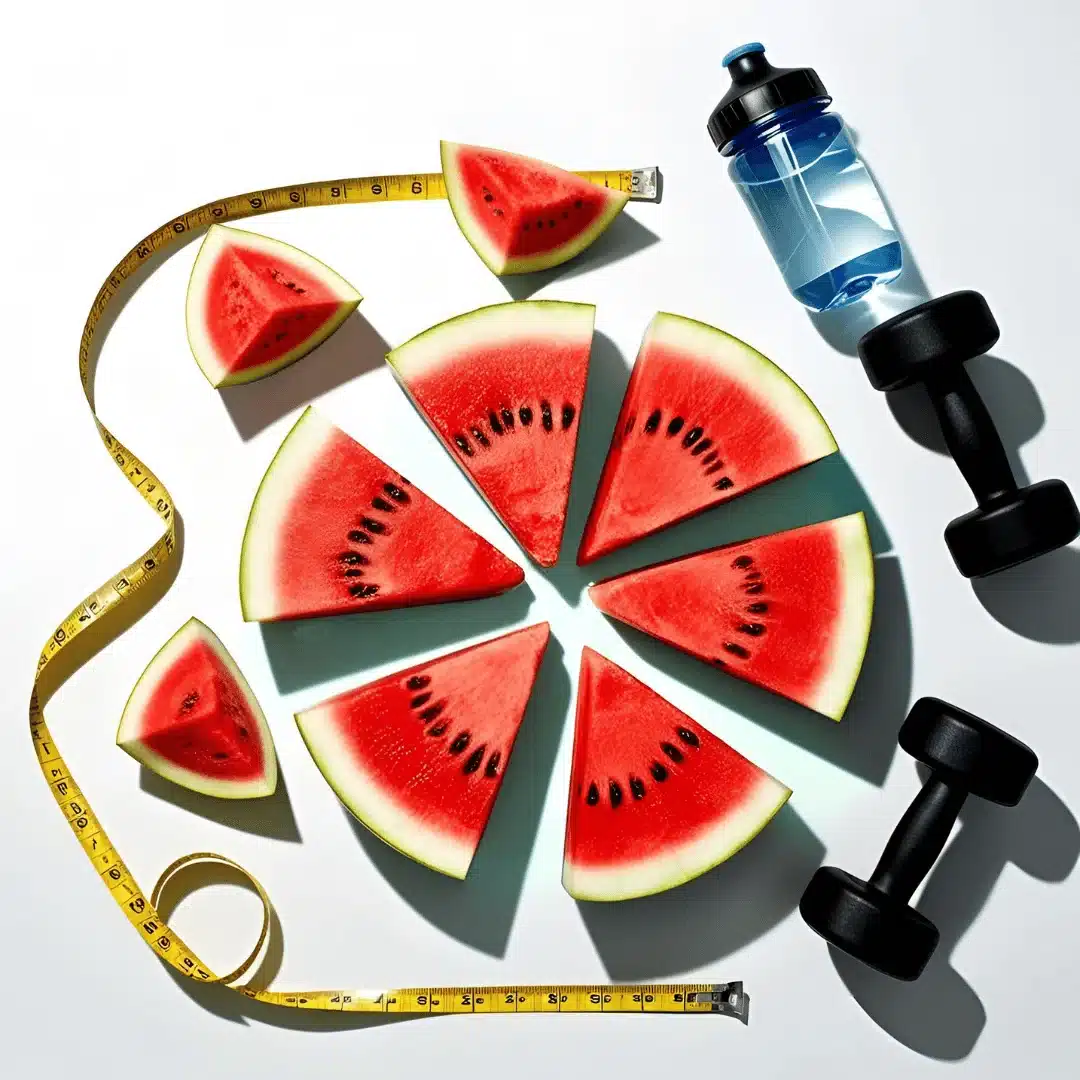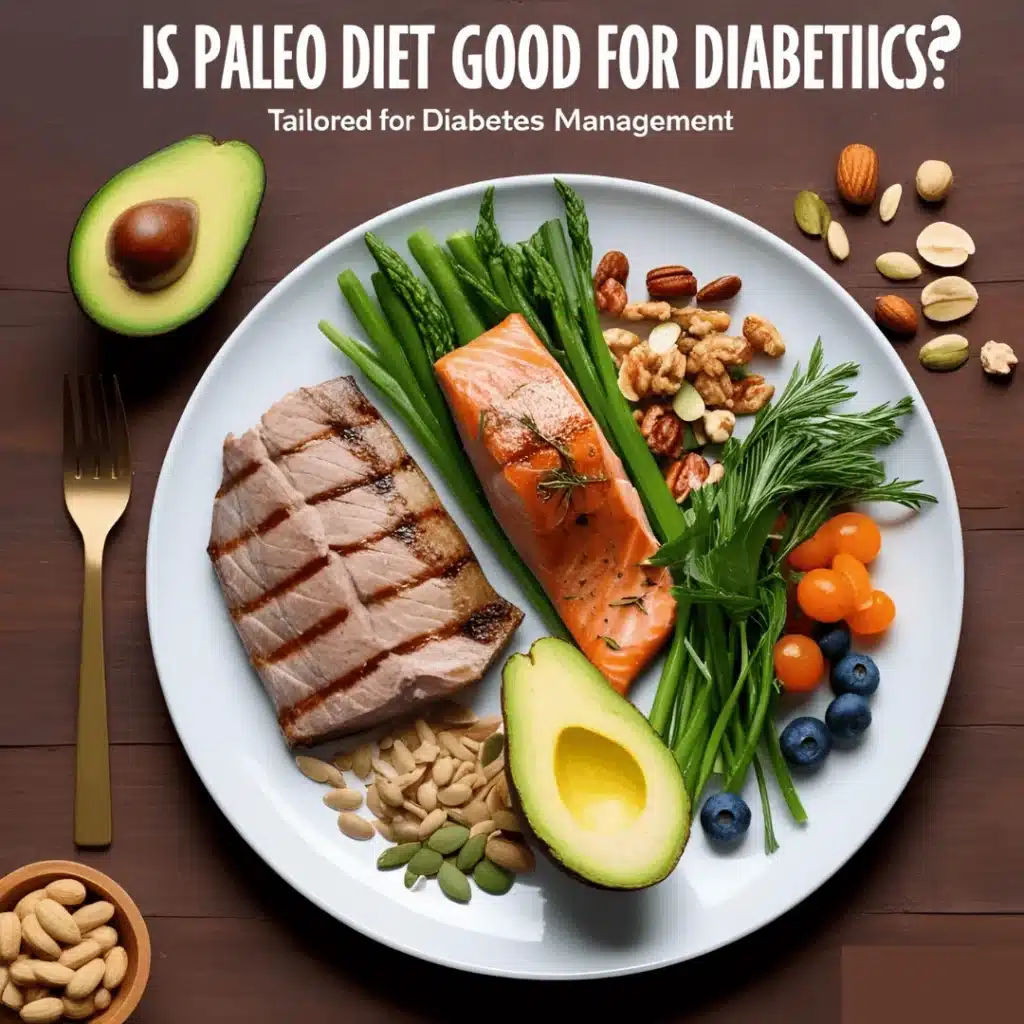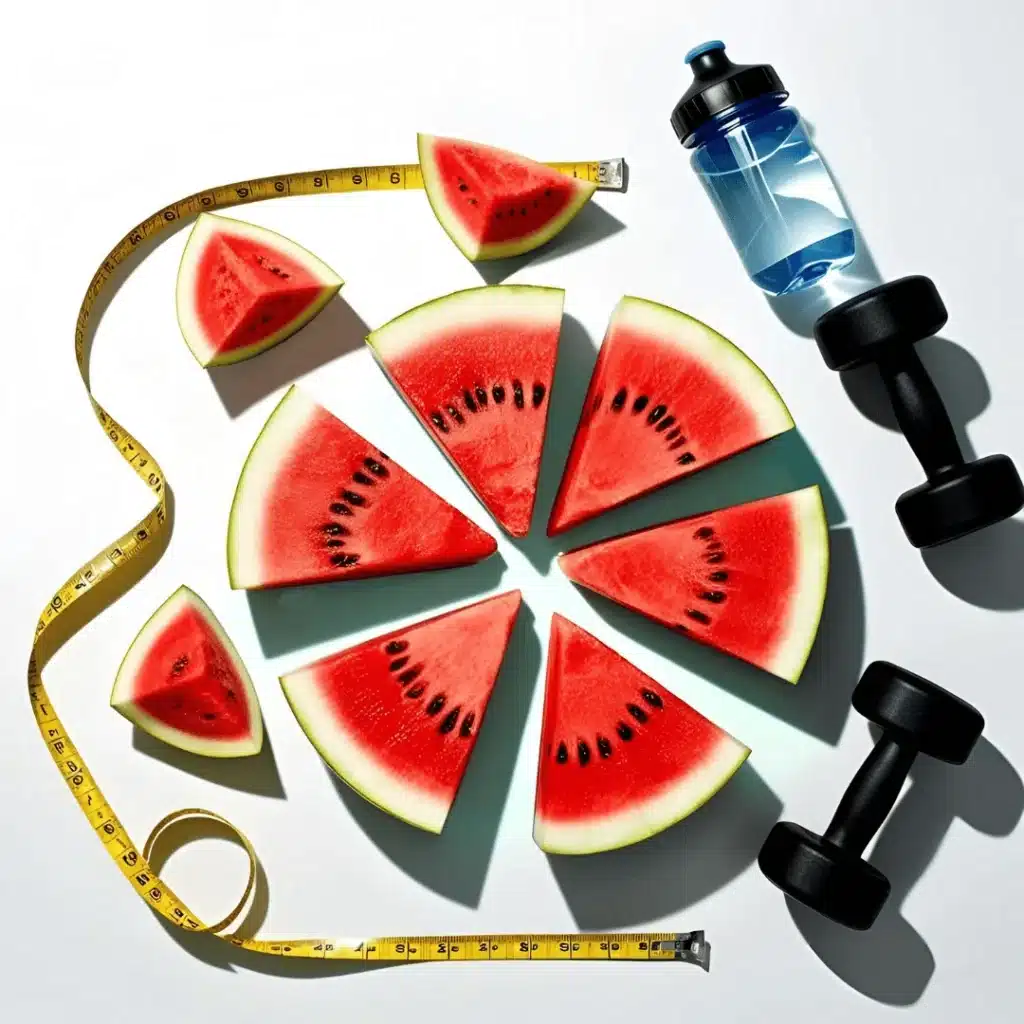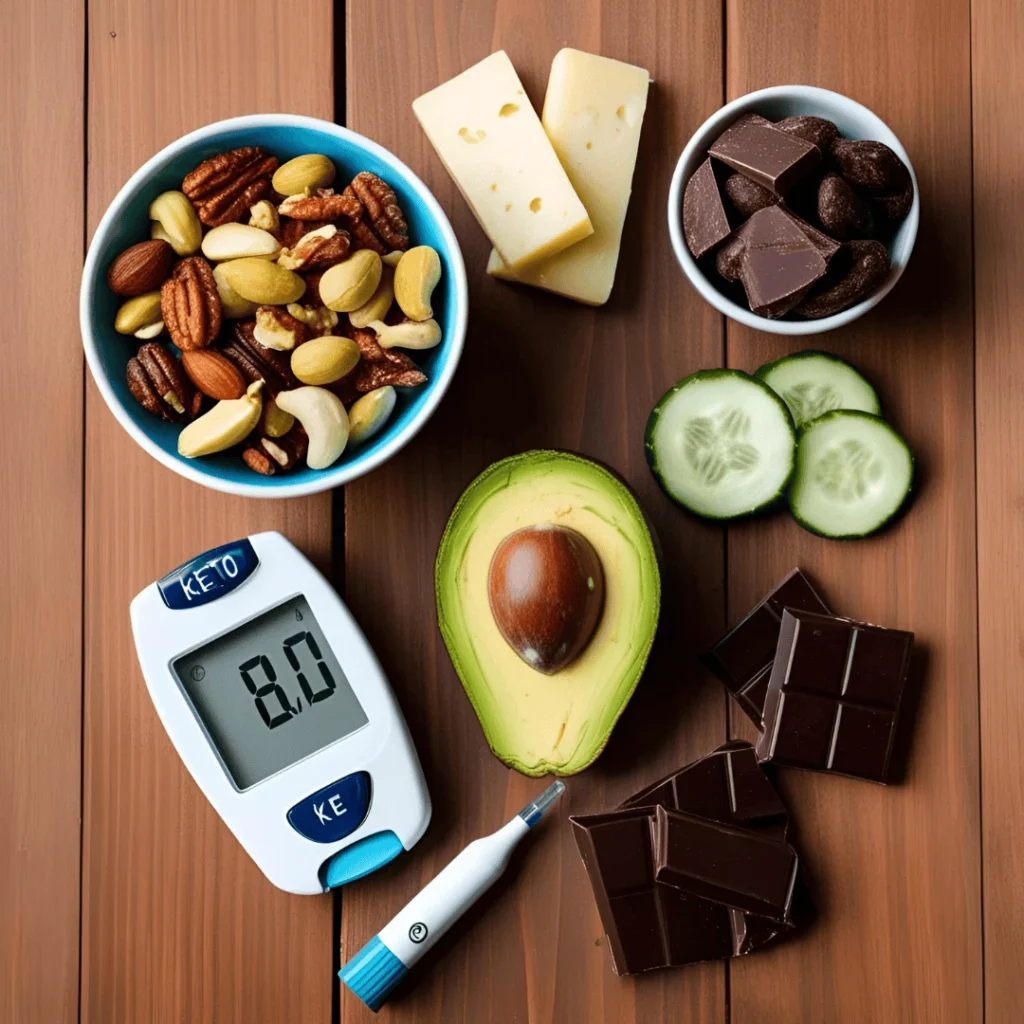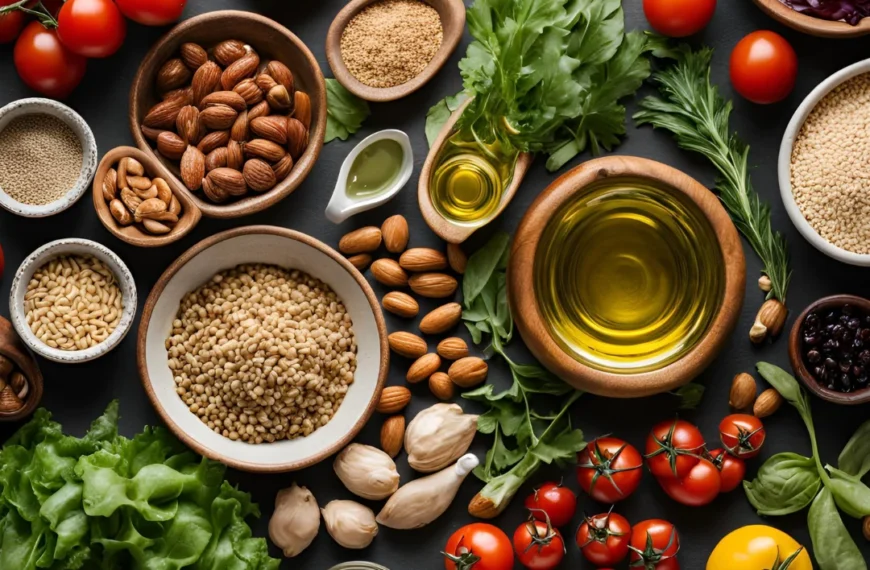Summary
Watermelon Diet is a restrictive diet plan typically followed for three to seven days and consists of only watermelon. Some versions permit small amounts of lean proteins, vegetables, or other foods, but watermelon remains the central focus. Being high in water content, this fruit is low in calories and thus a hydrating option, which can result in rapid weight loss in the form of water weight loss. Watermelon is also full of nutrients, including vitamins A, B6, and C, and antioxidants like lycopene and citrulline that can provide energy and support for your cardiovascular system. The diet is not a long-term sustainable weight loss or overall health solution.
In the short term, some people may find benefits from the Watermelon Diet, such as improved energy levels and hydration, but the diet is restrictive, according to the experts. Extreme calorie restriction deprives the body of essential nutrients and can result in health risks like nutrient deficiencies, muscle loss, and fatigue. People with pre-existing diseases, such as diabetes or kidney problems, should take special precautions as the diet may aggravate those diseases. Moreover, this rapid weight loss is more attributable to water loss than fat, so it’s not likely to lead to lasting changes.
Nutritionists suggest a more stable, sustainable form of managing weight. Instead of only consuming watermelon on its own, try pairing watermelon with something better to eat to get lean protein, whole grains, and other fruits and vegetables. You also want mindful eating, regular physical activity, and lifestyle changes that promote long-term health as the basis for effective and safe weight loss. For those with underlying health concerns, consulting with a healthcare provider before initiating any restrictive diet can ensure a personalized and secure approach to health and weight management.
Key Takeaways
- The central premise of this diet involves the low-calorie content of watermelon and its high water content. Within a few days, you could lose weight fast (but mainly in terms of water weight).
- Watermelon is rich in vitamins A, B1, B6, and C and contains lycopene, a natural energy source and antioxidant.
- Many people find this a restrictive diet alone it comes with some serious health risks, including nutrient deficiencies, muscle mass loss, and adverse health effects.
- Although some claim to have experienced short-term weight loss success with it, nutrition experts warn against using it as a long-term plan.
- Research shows that sustainable weight loss is achieved through healthy eating plans like the one described here rather than any fad diet, such as the Watermelon Diet.
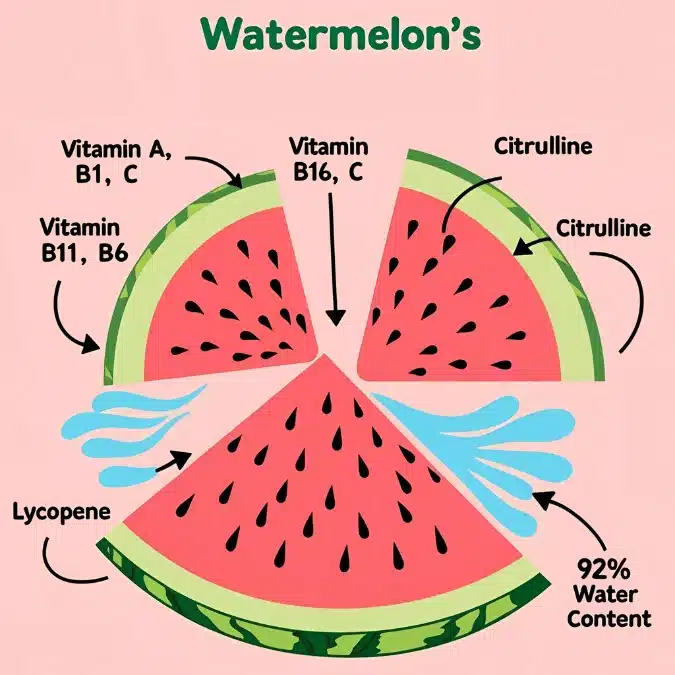
Introduction
The Watermelon Diet has become very popular as a possible weight loss plan, but what is it? The three-day, seven-day, or even longer watermelon diet has a couple of variations, but it mainly involves eating watermelon over and over all day. Although watermelon is a nutrient-dense food that provides vitamins A, B1, B6, C, and citrulline, it is the only food humans eat in a watermelon-only diet, which raises key health concerns. As Registered Dietitians, we get your fascination with this trending diet plan. This complete guide will take you through:
- The science of why the Watermelon Diet works
- Watermelon Benefits Based on Scientific Research
- The possible risks and limitations
- Insights on how effective it is.
- Safe options for managing your weight sustainably
Whether you’re thinking of trying this diet or are just interested in how it works, we will help you make an informed choice based on scientific research, not celebrity endorsements.
Understanding the Watermelon Diet
A detox program known as the Watermelon Diet has gained massive interest for its quick weight loss results. It’s a short-term eating approach that involves limiting yourself to mostly watermelon, but there are different versions with varying degrees of nutritional freedom.
Types of Watermelon Diet Plans
There are several different versions of the watermelon diet, all of which have specific guidelines and duration:
Strict Watermelon Cleanse
- Only eating watermelon for 3-5 days
- Only water is allowed. No other foods or drink
- Generally taken as a short-term detox dietary regimen
Modified Watermelon Diet
- Features watermelon as the primary ingredient
- Permits small portions of lean proteins and vegetables
- Typically followed for 7-10 days
- Less rigorous than the strict version More Sustainable
Watermelon Supplement Diet
- Consider having regular meals throughout the day
- Have one meal with watermelon instead
- Longer lasting (newer techniques can be developed)
- Very often employed as a mild cleansing method
Watermelon and Protein Diet
- Must include watermelon and protein sources
- Eggs, fish, or lean meats included
- Followed for 5-7 days
- So that we lose less muscle during the detox
There are also several variations of this detox program, each offering varying levels of restriction and flexibility for individuals with different goals and comfort levels. However, realizing that these short-term strategies are not designed for long-term eating modifications is essential.

Nutritional Profile of Watermelon
Watermelon is a nutritious food that packs a powerful punch. It is made up of 92% water and is great for hydration, but it also provides nutrients to the body.
Key Nutrients and Their Benefits
- Watermelon is an excellent source of lycopene, a carotenoid antioxidant that gives watermelon its red color. This compound protects cells from damage and supports heart health.
- The fruit is also rich in vitamin C, which boosts immune function and collagen production for healthy skin. It’s also high in vitamin A, which aids eye health and immune system function.
- Watermelon, on the other hand, has a higher concentration of citrulline, an amino acid that aids blood flow and decreases muscle soreness. This is especially helpful for athletes and those who are active.
- It also delivers potassium, an electrolyte that supports nerve function and muscle contractions. Thanks to its natural sugars, it provides energy without many calories.
Scientific Evidence Behind Weight Loss Claims
Although the watermelon diet is not well-studied, it has been extensively studied and shown to support a healthy weight. Most weight loss people would attribute to this diet is due to caloric restriction and water loss, not to any magical properties of the fruit itself.
Research Studies and Findings
However, emerging scientific evidence has shown that eating watermelon within a balanced diet may provide some potential weight loss benefits. Research suggests that watermelon’s high water content and low-calorie density may enhance satiety and diminish caloric intake.
However, studies have found that any substantial weight loss during the watermelon diet is mostly water weight. Restricting their diets to primarily watermelon leads individuals to consume very few calories, leading to a sharp initial weight loss. This weight usually comes back once eating gets back to normal.
Research published in the Journal of Nutrition shows that watermelon contains compounds that may help support metabolic health—but only when consumed as part of a diversified, nutrient-dense diet rather than alone. Researchers stress that healthy weight loss involves a multifaceted approach focused on sound nutrition, regular exercise, and behavior change. Overall, the watermelon diet is so restrictive that any evidence for long-term sustainable weight loss success is non-existent.
Health Benefits of the Watermelon Diet
The Watermelon Diet can benefit your health if it is followed correctly and for a short period. It is packed with vitamins and minerals.
Short-term Advantages
The Watermelon Diet can give you a natural surge of energy as it’s high in natural sugars and B vitamins. With that in mind, the fruit has a high water content, which helps keep the body hydrated an essential factor for helping keep the body running properly.
The low-calorie nature of the diet may also play a part in lowering heart disease risk, which can accompany weight gain and be caused by compounds in foods such as lycopene from tomatoes found heart-healthy. Watermelon also has citrulline, an amino acid that may help enhance blood flow.
Rich in diuretic properties, watermelon greatly benefits from flushing out impurities when detoxing. Water- and fiber-dense can help cleanse the digestive system and nourish the kidneys. The diet’s simplicity can help give your digestive system a break while fueling essential nutrients. Many people experience a feeling of lightness and increased energy during the first days of the diet, but these are primarily short-lived effects.
But these are all temporary effects and not a long-term health solution. Always check with a health professional before beginning any restrictive diet plan.
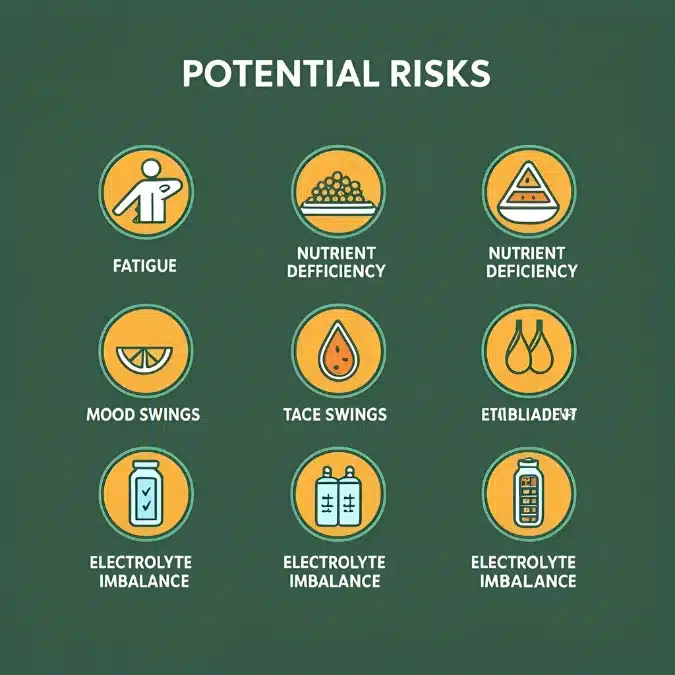
Potential Risks and Side Effects
Medical Considerations
Following any restrictive diet, such as the watermelon diet, can have several adverse effects on your health that you cannot ignore. Fad diets, especially those which emphasize eating one food, can be hazardous for some groups.
Watermelon has a high glycemic index, which can cause dangerous fluctuations in blood sugar levels, so people with diabetes need to be especially careful. Because of the high potassium concentration in watermelon, those who have kidney issues might be at higher risk of experiencing complications.
Severe caloric deprivation can result in these and other side effects:
- Intense head pain and dizziness
- Muscle weakness and fatigue
- Electrolyte imbalances
- Dehydration (although watermelon contains a lot of water)
- Nutritional deficiencies
Pregnant women, nursing mothers, and individuals with other pre-existing medical conditions should not follow this restrictive diet at all. A deficiency in these nutrients especially protein and healthy fats. It can impair immune response and overall health.
The diet might also interfere with some medications, so it’s key to clear it with your healthcare providers before starting. People with digestive disorders may have:
- Bloating and gas
- Stomach cramps
- Diarrhea
- Acid reflux
Also, this abrupt change in diet may affect mental health, resulting in mood swings, irritability, and lack of concentration. But the extreme nature of this diet could trigger or exacerbate an existing eating disorder, too.
Expert Opinions and Analysis
Professional Recommendations
According to leading nutrition expert Samantha Cassetty, while watermelon could be part of a healthy diet, it is potentially unhealthy to depend solely on it. Nicknamed the watermelon diet, she cautions that it is restrictive and does not give your body the necessary nutrients to perform optimally.
Registered dietitian Kayli Anderson notes that even the initial weight loss experienced on the watermelon diet is likely fleeting, mainly due to water loss. Such extreme dietary restrictions, she emphasizes, can lead to nutritional deficiencies and could trigger disordered eating patterns.
Both say that eating watermelon as part of a balanced, varied diet is a far healthier way to consume the fruit than attempting the watermelon diet. Instead of pursuing quick-fix solutions, they encourage adopting sustainable eating habits that feature a variety of fruits, vegetables, lean proteins, and healthy fats.
These practitioners also underscore the need to consult doctors before taking on any restrictive diet, particularly among those who have underlying health conditions or are on medication.
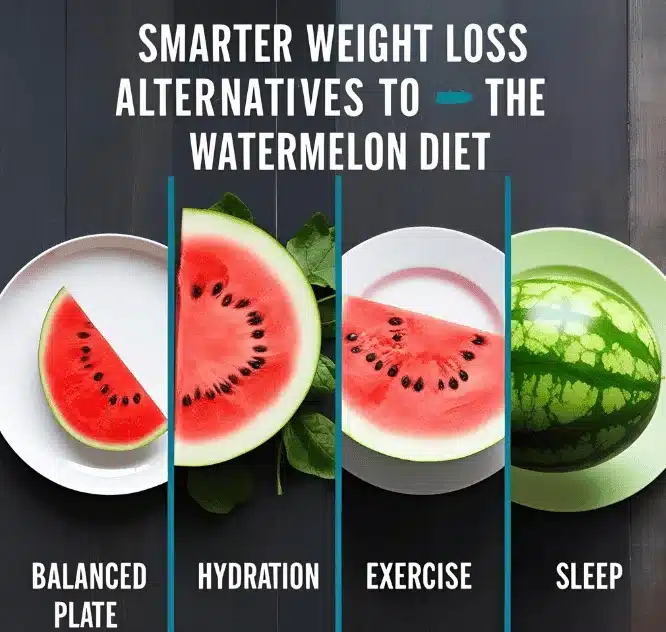
Healthier Alternatives to the Watermelon Diet
Extreme diets, like the watermelon diet, provide much less sustainable results than a balanced approach to weight management. Here are some healthier alternatives that can help you stay on your wellness track.
Sustainable Weight Loss Approaches
You must take a thoughtful, gradual approach to make enduring changes to your health. Move away from restrictive dieting and condition your body to make one small change at a time in your lifestyle.
Instead, incorporate more whole foods into your meals while following appropriate portions (yes, portions do matter). This will ensure that you get every essential nutrient without feeling deprived.
Here are some weight loss tips grounded in scientific evidence:
- Eat mindfully by listening to hunger signals
- Make sure you consume lean proteins, whole grains, and lots of vegetables
- Drink enough water throughout the day
- Practice regular physical activity that you enjoy
- Get enough sleep and manage stress
Sustainable weight loss is not about quick fixes, so keep this in mind. You should consistently focus on eating a balanced diet, exercise often, and change your lifestyle to demolish those extra pounds.
Conclusion
Although appealing because of its simplicity and quick results, the Watermelon diet must be taken cautiously before embarking. We’ve identified the downside of watermelon eating and its possible benefits by conducting a thorough analysis. Instead of going along with a quick fix like this watermelon diet, include watermelon in a healthy, balanced, and sustainable diet.
When on a balanced diet with other wholesome foods, its high water content, key nutrients, and antioxidants say help your overall health and weight management goals. Remember that sustainable weight loss is about making the right choices over the long term, not about some extreme dieting regimen.
If weight loss is something you’re serious about, talk to a nutritionist for a personalized, balanced meal plan that includes plenty of healthy food, including watermelon. This will facilitate a particular outcome and its sustainability and preserve your long-term quality of life.
FAQs
1.Can I exercise while following the watermelon diet?
Due to its low-calorie state, intense exercise is not advised on the watermelon diet. According to experts, the diet lacks sufficient energy and nutrients for working out, which may contribute to fatigue, dizziness, and muscle weakness.
2.How much weight can I realistically lose on the watermelon diet?
Although you might lose about 5-10 pounds in the beginning, that is mostly water weight. So, while the first few weeks may show rapid weight loss, this is not sustainable and will mainly be due to the high water content of the watermelon itself and because you are almost entirely denying your body food rather than burning fat.
3.Will the watermelon diet help with bloating and digestion?
The high water content and fiber in watermelon can temporarily stimulate digestion and decrease bloating. But because watermelon is so high in sugar, eating only watermelon could upset the natural bacterial balance in your gut, which could lead to digestive problems in the long run.
4.Can I modify the watermelon diet to make it healthier?
Do not limit your diet to just watermelon, as the watermelon-only fad diet would dictate, but include watermelon as part of a balanced eating plan. Eat it as a healthy snack or dessert with other nutritious foods for added benefits.
5.Does the watermelon diet affect blood sugar levels?
Watermelon is technically a fruit but has a relatively high glycemic index. Eating only watermelon can lead to spikes and crashes in blood sugar levels, making it particularly bad for individuals with diabetes or blood sugar problems.
6.How long does it take to see results from the watermelon diet?
Although the experience of a 3–5-day process for early results has been alleged, mainly through water weight loss and calorie restriction, these fast results are generally short-lived. They can flip back as soon as normal eating starts again.

